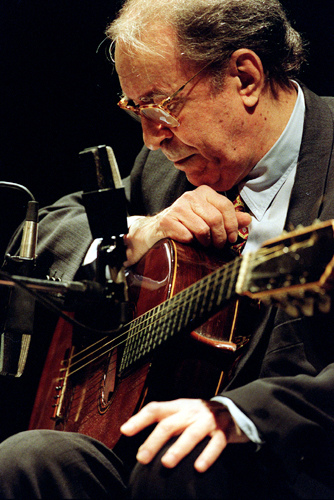
João Gilberto
João Gilberto (born João Gilberto do Prado Pereira de Oliveira – Portuguese: [ʒuˈɐ̃w ʒiwˈbɛʁtu]; 10 June 1931 – 6 July 2019) was a Brazilian guitarist, singer, and composer who was a pioneer of the musical genre of bossa nova in the late 1950s. Around the world, he was often called the "father of bossa nova";[1][2][3] in his native Brazil, he was referred to as "O Mito" ("The Legend").[4] In 1965, the album Getz/Gilberto was the first jazz record to win the Grammy Award for Album of the Year. It also won Best Jazz Instrumental Album – Individual or Group and Best Engineered Album, Non-Classical. Nominated at the Grammy 1978 in the category Best Jazz Vocal Performance, album Amoroso, and winner category in Grammy 2001 with João voz e violão Best World Music Album.
For the self-titled album, see João Gilberto (album).
João Gilberto
6 July 2019 (aged 88)
Miúcha (1965–1971)
Maria do Céu Harris (1984–2003; 2005–2019)
Claudia Faissol (2003–2005)
3, including Bebel
- Musician
- composer
- Guitar
- vocals
1949–2008
- Enamorados do Ritmo
- Garotos da Lua
Early life[edit]
João Gilberto was born in Juazeiro, Bahia, the son of Joviniano Domingos de Oliveira, a wealthy merchant, and Martinha do Prado Pereira de Oliveira. He lived in his native city until 1942, when he began to study in Aracaju, Sergipe, returning to Juazeiro in 1946. At the age of 14, Gilberto got his first guitar from his grandfather despite disapproval from Gilberto's father.[4] Still in Juazeiro, he formed his first band, called "Enamorados do Ritmo". Gilberto moved to Salvador, Bahia, in 1947. During his three years in the city, he dropped out of his studies to dedicate himself exclusively to music and at the age of 18 began his artistic career as a crooner at the Rádio Sociedade da Bahia.[5]
Musical style[edit]
Gilberto's style combines traditional elements of samba with more contemporary jazz.[1][3] His "unique"[1] acoustic guitar style involves a syncopated rhythm of plucked chords, with chord progressions rooted in the jazz tradition.[3] His vocal style has been described as "laid-back and understated".[3] In 2023, Rolling Stone ranked Gilberto at number 81 on its list of the 200 Greatest Singers of All Time.[19] Leonardo Rocha, in his obituary for the BBC, states that Gilberto's music describes "a period of huge optimism in Brazil".[1]
Personal life[edit]
Gilberto first married the singer Astrud Weinert,[20] with whom he collaborated on the hit recording of "The Girl from Ipanema"; the couple had a son called João Marcelo.[21] They divorced, and he later married the singer Miúcha (died 2018); they had a daughter, Bebel Gilberto, who is also a singer. They later separated. Gilberto also had a daughter with Claudia Faissol, a journalist.[1][3]
Gilberto lived alone from around 2009. His final years were marked by money problems as well as declining health.[1] In 2011, he was sued and evicted from an apartment in Leblon by his landlord, Countess Georgina Brandolini d'Adda.[22] It was reported in December 2017 that his daughter Bebel was seeking control of his financial affairs because of his declining mental state and increasing indebtedness.[23]
On 6 July 2019, Gilberto died at his apartment in Rio de Janeiro.[24] His body was buried in Niterói following a private ceremony on 8 July 2019.[25]
Writing in The Guardian after his death, Dom Phillips described Gilberto as ".. one of the country's greatest musicians and composers, a reclusive genius in a nation of extroverts whose work recalled happier, more optimistic times for a deeply divided nation."[26] In The Washington Post pop critic Chris Richards said, "His voice was one of the most intimate sounds of the 20th century – more melodic than a sigh, more rhythmic than chitchat, only just barely. Every syllable that appeared on his lips carried an air of effortlessness, but Gilberto had worked hard to locate that sacred place where a human breath becomes music."[27]
Gilberto has released several studio and live albums:[28]